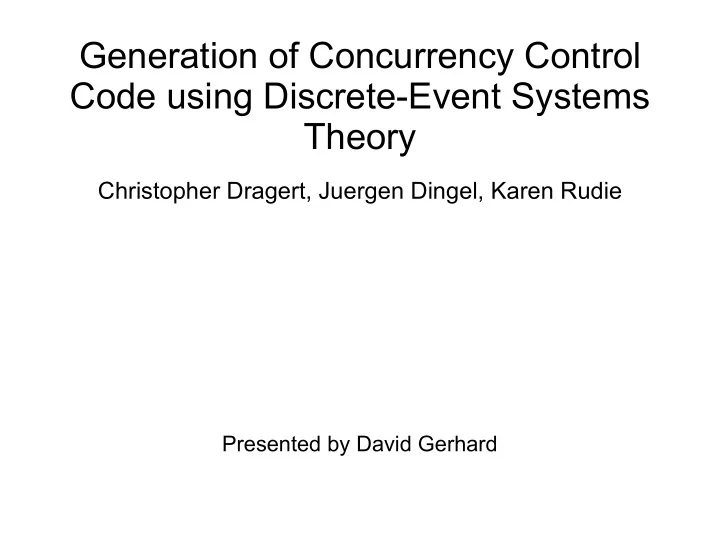

Generation of Concurrency Control Code using Discrete-Event Systems Theory Christopher Dragert, Juergen Dingel, Karen Rudie Presented by David Gerhard
Motivation ● Optimal usage of today's Multi-core systems requires parallel executable Software ● Efficient and correct concurrent source code is hard to write and debug → facilitate development of concurrent source code
Introduction ● Automatic generation of concurrency control code ● Input – Source code without concurrency control – Informal specification of the desired concurrent behaviour ● Output – Source code with concurrency controls
Introduction ● Aims ● No Deadlocks ● No Starvation ● Minimally restrictive → using control theory (Discrete-event System)
DES - Supervisor-Plant ● System(Plant) modelled as a finite-state automaton (FSA) ● Transitions in FSA are called events – Events can be controllable or uncontrollable ● Supervisor modelled as a FSA ● Enables or disables controllable events Supervisor Control Action Event Plant
Process Overview Uncontrolled Source Code Controlled Source Code Informal Specification
Process Overview Uncontrolled Source Code Event-Marked Source Code DES Plant Controlled Source Code Informal Formal DES Supervisor Specification Specification
Relevant Events ● Find relevant events for concurrency control ● Example – Enter/Exit Critical Section → relevant – Accessing shared variable → non-relevant ● Mark events in the source code ● Differentiate controllable and uncontrollable events
Example ● 5 Threads with Code example for Thread 3: dependencies public void run() { ● 1 → 2,3,4 // relevant event: T3-start System.out.println(id); ● 5 → 4 doWork(); } 1 5 2 3 4
DES Plant ● Build a Finite-state automaton (FSA) representing all possible event sequences for each Thread ● Build control-flow graph(CFG) from source code ● Reduce CFG – All relevant events remain – All non-relevant events important for CFG structure remain
Example Code example for Thread 3: T3-start run() { Sys... public void run() { // relevant event: T3-start System.out.println(id); doWork 2 } doWork(); } T3-start 1 2 2
Process Overview Uncontrolled Source Code Event-Marked Source Code DES Plant Controlled Source Code Informal Formal DES Supervisor Specification Specification
Formal Specification ● Specifies the allowed subset of event sequences ● FSA for each restriction ● Only restrictive
Example T1-finish 1 2 2 T5-finish T1-finish, T2-start, T3-start, T4-start, T5-finish T5-finish 1 2 2 T1-finish, T2-start, T3-start T1-finish, T2-start, T3-start, T4-start, T5-finish
DES Supervisor ● Only one supervisor (simplification) ● Different FSA's need to be combined into a monolithic specification ● Scalability issue
Process Overview Uncontrolled Source Code Event-Marked Source Code DES Plant Controlled Source Code Informal Formal DES Supervisor Specification Specification
Code Generation ● Supervisor needs to block non allowed controllable events ● Generates a Semaphore for each controllable event set to the initial state ● Supervisor state changing function enables/disables controllable events
Example – Thread 3 //relevant event: T3start while (true) { if(Synchronizer.stateChangeTest("T3start", Synchronizer.T3start)) break; Synchronizer.T3start.acquireUninterruptibly(); Synchronizer.T3start.release(); }
Example – Supervisor I public static synchronized Boolean stateChangeTest(String event, Semaphore eventBlocker) { if (!(eventBlocker == null)) { if (!eventBlocker.tryAcquire()) { return false; } eventBlocker.release(); } changeSupervisorState(event); return true; }
Example – Supervisor II private static void changeSupervisorState(String event) { if (event.equals("T1finish")) { switch(Synchronizer.stateTracker) { case(0): Synchronizer.T3start.release(); Synchronizer.T2start.release(); Synchronizer.stateTracker = 1; break; case(1): ...
Verification ● Discrete-event theory is proven correct and non blocking ● Formal proof for algorithm is still needed ● Modelchecker (Java Pathfinder) ● Input not reliable!
Limitations ● No dynamic threads generation allowed ● Monolithic supervisor not very efficient ● Starvation not properly addressed
Conclusion ● DES theory can be applied to concurrency ● Chosen FSA-based version of DES not expressive enough ● Further work needed
Questions ?
Recommend
More recommend